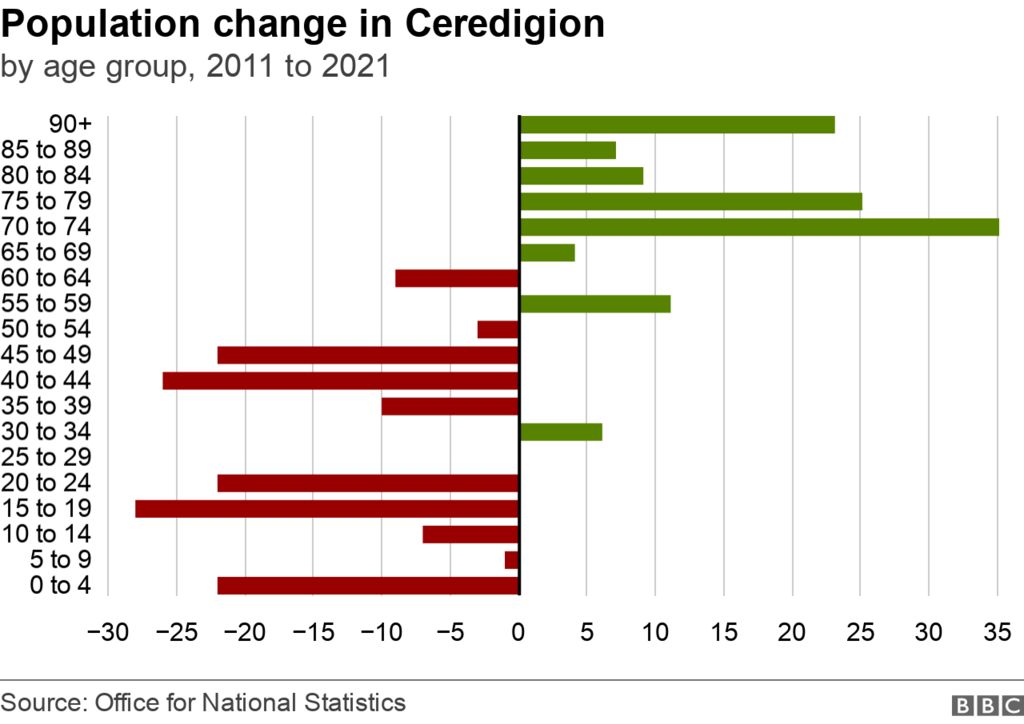Rural counties are in the grip of a “brain drain” that must be stopped, say politicians and academics.
Ceredigion Senedd member Elin Jones said new census data is a wake-up call that demanded work to keep young people in constituencies like hers.
The 2021 census revealed that since 2011, Ceredigion has seen a 28% drop in the number of 15 to 19-year-olds.
Over that time, the number of 40 to 44-year-olds fell by 26%, the survey showed.
The Welsh government said it was doing everything it could to ensure Wales is a country where people do not leave, and where young people can live, study and work in Wales.
Population falls occurred in schoolchildren, the working age population and young adults likely to be thinking of starting families.
Across Wales there were reductions in these ages in other rural counties, but the falls in Ceredigion were greater.
Seven areas saw total population falls, with the 5.8% drop in Ceredigion the third steepest in England and Wales.
‘Significant decrease’
Ms Jones called on councils and the Welsh government to respond, and wants a conference focusing on the problem.
She said: “We are seeing the phenomenon of rural depopulation, especially amongst young people, continuing from the last century into the 21st Century. There’s quite a significant decrease in the 15-24 age range in Ceredigion again.”
She said job vacancies were going unfilled, including in the health and care sectors.
“We need young people in a community such as Ceredigion to make sure that it’s sustainable in the long run,” she said.
“So we need to address some of these issues that are causing it.”
The county saw the number of 30 to 34-year-olds rise by 6%, but falls in 35 to 54-year-olds ranged from 3% to 26%.
Ms Jones believed the best brains were needed to find what would make young people stay in Ceredigion.
She said: “It will require sustained effort, it will require actions – in the economy, in making rented housing and housing to purchase more affordable.
“But it also means that we need to do a bit of marketing about what does make Ceredigion a special place to live.”
Why do young people leave?
Cai Ladd and Wyn Jones, both in their 30s, were raised in Beulah, Ceredigion, but now live and work away. Wyn is an architect in London and Cai an academic in Swansea.
Cai said almost all of his old friends had left Beulah.
“That’s a huge loss for the community,” he said.
Wyn said young people leave to find work and study, adding: “There’s a very clear route for people to leave to go for education, to go for work, but not a very clear route to come back.”
Asked what would help, he said: “Improved transport, business grants, certainly for people moving back early in their career.
“Improvements in the ability to buy houses. It’s almost impossible to rent houses in west Wales.”
Meanwhile, the proportion of older people is growing, with a 17% increase in the number of those aged 65 and over in the county from 2011 to 2021.
Across Wales there were 18% more people over 65 in 2021 than a decade earlier.
Age Cymru Ceredigion president, Lyndon Lloyd, from Beulah, said “The issue now is the polarisation between the higher rates of elderly who will need care, and the baseline in the county of young people who will go into the care service.”
Young people leaving rural areas is not just a Welsh problem.
‘Contentious issue’


In Italy, to attract new residents villages have sold abandoned homes for €1and councils have offered to pay the rent of families who move and send a child to a local school.
Prof Rhys Jones, of Aberystwyth University’s geography department, said the census data showed a continuing and established pattern characterised by more old people in some parts of Wales.
He said: “There are different options. In certain states, there have been attempts to try and encourage young people, families to have more children.
“But there are also more radical options in terms of looking again at migration, at attracting people to come and work in certain parts of Wales to fill the gaps that exist in terms of different services and different sectors.
“Obviously, that is a contentious issue given that we’ve just come out of the whole Brexit process.”
He agreed with Elin Jones that councils and the Welsh government needed to respond.
“They certainly need to plan proactively for a future in which there are potentially fewer people living in their local authority areas,” Prof Jones said.
“And I think there needs to be some proactive planning in terms of the kinds of services that they need to supply in the future, the kinds of training that young people need in order to be able to go into different sectors, whether that’s increasingly into care homes, into the health sector as well.”
A Welsh Government spokesperson said: “Our focus is on increasing economic growth opportunities across the length and breadth of Wales, as part of our plans to create a more prosperous Welsh economy.
“We are tackling the issue of large numbers of second homes which can affect communities and their sustainability, and delivering 20,000 low-carbon homes for rent in the social sector over the course of this term of government and we’re also taking action to create good jobs wherever people live.”
A spokesperson for the Welsh Local Government Association (WLGA), which represents Wales’ local authorities, said: “The nine local authorities that make up the WLGA Rural Forum are home to a third of the Welsh population who deserve equal consideration and opportunities to thrive.
“The Forum has called for a targeted rural youth programme to invest, upskill, attract and retain bright and talented young people in rural communities, and last year published a manifesto to reveal how to go about this.
“Another target in the manifesto is that housing will reflect local community needs, this includes tailored housing policies to support the needs of rural communities to stimulate local economies and retain a younger demographic, with capital subsidies to build affordable homes across a range of tenures and the identification of opportunities to explore cooperative housing in empty community properties.
_________________





